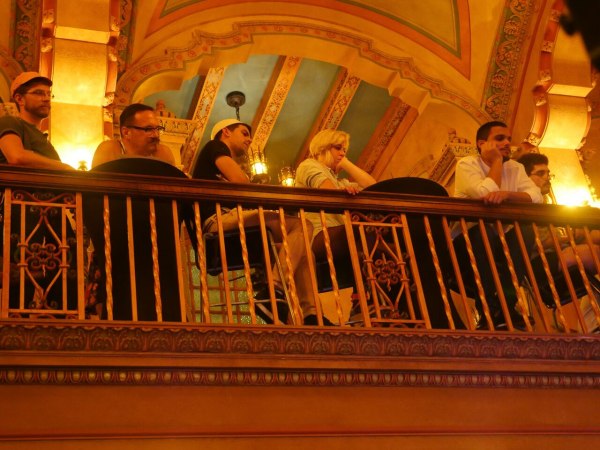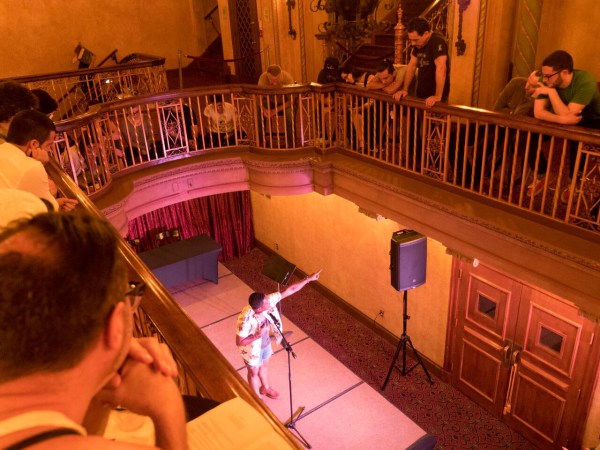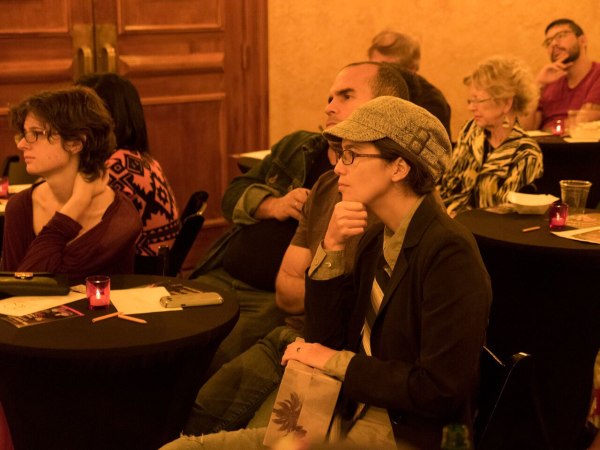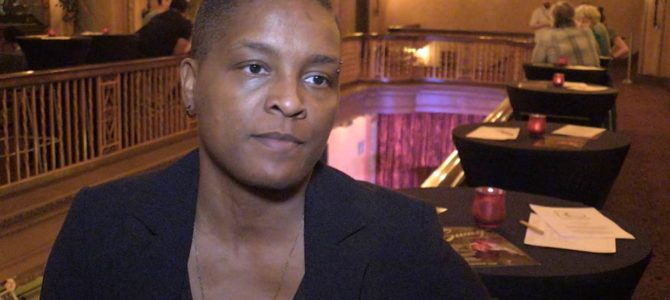“Paris is Still Burning”, an energetic poetry reading and performance showcased contemporary LGBT poets of color this week.
Four artists, known for their work exploring social, racial and economic justice, were handpicked to read and perform at an event held by the Reading Queer Literary Festival at the 32nd annual Miami Book Fair International.
The event, who’s title is an homage to the 90s cult film chronicling the 1980’s “ball” culture of New York City, also included a mini “ball” – described as “a mix between a drag pageant and a queer performance competition.”
“This ain’t your momma’s poetry,” Neil de la Flor, executive director of Reading Queer, told NBC News. De la Flor said he was inspired by a similar, off-site event held earlier this year at the Association of Writing Professionals conference in Minneapolis, held by Patricia Smith.
“The idea [behind Smith’s event] was there aren’t enough queer voices of color represented at these book fairs,” Flor said. “It was a bare space, very raw, and just 2.5 hours of pure poetry. I wanted to bring this to Miami.”
De la Flor handpicked the artists for Paris is Still Burning, with a theme in mind. “Their work extends beyond the LBGT spectrum, into larger sociopolitical issues, which are important to me,” De La Floor said, “and important for culture to experience, in this kind of setting.”
NBCBLK Contributor Craig Stanley spoke with the artists before the show.

DAVID TOMAS MARTINEZ
What inspires your poetry these days?
I always look into some sort of past event in my own personal history, and I try to relate that to something that is a greater idea. I’ll take some sort of personal idea to ground it, and sort of intermingle that with either current events, popular music, movies, references. I’m constantly trying to switch registers of language, different milieus, high-low art culture, as much of a hodge-podge as I can get, but to where it’s seamless.
Being able to speak to multiple people, that’s the important thing.
Who are you writing for?
I don’t know if I’m writing to one specific milieu — I’m writing to everyone, and hopefully they can take a piece of, like, who I am. if I was just writing to Chicanos, or Latinos who grew up in the inner city, my readership would be small. I want reach various different people, and as many as I can – people that read poetry, people that don’t.
One of the things I’ve been most proud of, with my book “Hustle”, is that people have come up to be and been like, “Man I really dig your book. I don’t like poetry, but I like your book.” And, for it to be accepted by critics and academics, but also just somebody that grew up in the hood that’s going through a similar experience– being able to speak to multiple people, that’s the important thing.
———-
JUSTIN PHILLIP REED
How would you Describe your poetry?
Cerebral, depressive. I struggle a lot with being sort of anti-social. I spend a lot of time inside, and so, in my work there is this hyperawareness of being amongst other bodies, and kind of navigating spaces that aren’t always conducive to my personal identity — that being queer black male.
People tell me when I’m on stage, I seem like a different person that’s a bit more tense and angry — so I think that’s some form of expression I don’t generally tap into during my normal life, but that’s there as well.
When I read, I want to make it an offering. I want it to be communal.
How does it feel to get on stage and share that intimacy with an audience?
When I read, I want to make it an offering. I want it to be communal. I want it to feel like I’m sharing a very intimate part of me with an audience. That’s another thing – I’m not really an expressive person, not very outgoing. So it is very personal and an offering, when I am reading.

What’s an example of some of your work that’s special to you?
I live in St. louis now, I’ve been going to Washington University, and I’ve been there since the uprising last August, I’m very proud [of my latest Manuscript, Indecency] because it documents a time when I for one was trying to tap into new realizations of my own blackness, new realizations of what it is to be sort of this objected body in spaces that generally don’t want you.
This is a space that most of us inhabit, even if we don’t acknowledge it.
And to have very real violence done to people that you love or could love – and to have to think about that, and still negotiate spaces – like academia, going to class, having to teach, and having all of these things on your mind and on your spirit.
What do you hope people can take from your work?
Communion. A shared experience – particularly of that “cerebralness,” of that psychology of feeling this weight and still being a survivor, and [having] to push on — or sometimes you don’t, sometimes you cave in. But I want people to know that this is a shared experience, not something that we all singularly go through. This is a space that most of us inhabit, even if we don’t acknowledge it.
———-
DANEZ SMITH
What do you hope to accomplish today?
I’m excited today to celebrate black queer bodies here today, as well as to give us a communal place of mourning as well. I think, especially in our times today, we talk about blackness, we talk about oppression all over the world. we have to balance how we talk about the pain, with the joy, I my eyes. what I’m trying to do in a lot of my work is offer us a space to feel all of those things.
What do you want people to take away from your work?
For my work, I want people to walk away not being able to be apathetic. I think we are trained to be apathetic toward certain narratives, certain stories, certain people, and their pains, in our country, and my work is all an attempt to sort of, not allow for that dullness or for that numbness to exist. I need people to feel, and that’s the only way we’re going to change, so I Hope, from my work, people can take away that.
I’m trying to breathe more life into poetry. I think it’s been in the hands of dead men, and people who read like they’re dead, for a little bit too long.
What effect has the internet had on Poetry?
The internet is great. it’s a way for us to take poetry, which for a lot of years, had been pigeonholed into the academic spaces of the world, back and put it in to the hands of the people. there are poets that are famous because of Tumblr, which is great. There’s a lot of us who have become more known because of YouTube, and things like that. It’s giving poetry back to the people that it belongs to.
You’re taking poetry to another, physical level.
I’m trying – and I think all of us are, trying to breathe more life into poetry. I think it’s been in the hands of dead men, and people who read like they’re dead, for a little bit too long.
Spoken word has been here and it’s sort of gets us alive. I’m not interested in going up there and giving some bland reading today, I want to sweat, I want to get people shouting. I think that’s where poetry has its most power.

———-
DAWN LUNDY MARTIN
Tell us about your work.
My work is really attending to this question of selfhood. What is it to be a black, female, queer, gender queer, person living in America today? What is that experience like? It also deals with historical trauma, both personal trauma, and the kind of historical trauma that we experience as people of African descent, as women, as queer people in this country.
Art and literature are the things that, you know, move us emotionally, that help change our interior…
What do you make of poetry today?
I think that art and poetry have a big role to play in cultural change. I think that it is on the other side — but equally as important as direct action, because it’s the stuff that people get really emotional about.
Art and literature are the things that, you know, move us emotionally, that help change our interior, that help change the way we feel about ourselves and each other.
So I think it’s an exciting time for poetry and I think poetry has a lot to say in this kind of current, kind of devastating historic moment that we live in.

